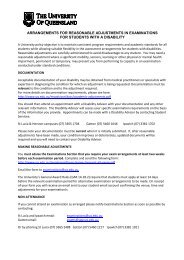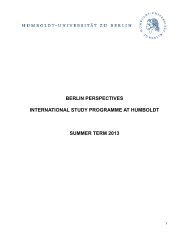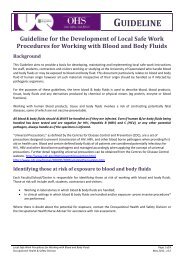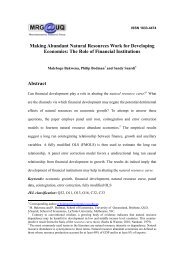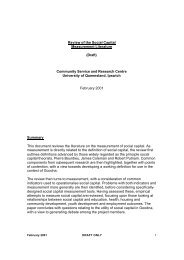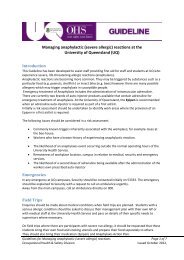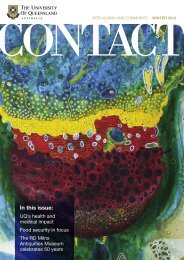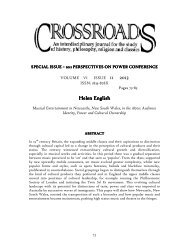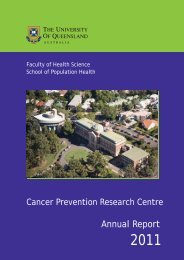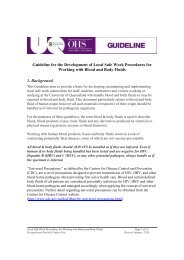Managing Traffic Incidents - University of Queensland
Managing Traffic Incidents - University of Queensland
Managing Traffic Incidents - University of Queensland
Create successful ePaper yourself
Turn your PDF publications into a flip-book with our unique Google optimized e-Paper software.
Publications<br />
Dia, H (2000a) A conceptual framework for modelling<br />
the environmental impacts <strong>of</strong> intelligent transport<br />
systems, Proceedings <strong>of</strong> the XI Pan American<br />
Conference in <strong>Traffic</strong> and Transportation Engineering,<br />
19-23 November 2000, Gramado, Rio Grande do<br />
Sul, Brazil.<br />
The work reported in this paper is part <strong>of</strong> an ongoing<br />
research project which aims to evaluate a<br />
modelling framework that can be used to assess<br />
the environmental impacts <strong>of</strong> Intelligent Transportation<br />
Systems (ITS).<br />
These systems aim to reduce traffic congestion<br />
and enhance air quality through the application<br />
<strong>of</strong> advanced communications, electronics<br />
and computing technologies. It is still not clear,<br />
however, whether the potential environmental<br />
benefits <strong>of</strong> improved system efficiencies could<br />
be partially <strong>of</strong>fset by the induced travel associated<br />
with ITS services. The techniques currently<br />
available to evaluate the impacts <strong>of</strong> ITS on the<br />
environment are not capable <strong>of</strong> addressing this<br />
question because they do not take the induced<br />
travel, demographics, land use and growth-indemand<br />
changes into consideration. As a result,<br />
a number <strong>of</strong> new techniques aimed at evaluating<br />
the full traffic and environmental implications<br />
<strong>of</strong> ITS deployment have been proposed in the<br />
literature.<br />
This research will contribute to progressions<br />
in the needed methodologies by evaluating a<br />
number <strong>of</strong> modelling platforms that address the<br />
short and long-term potential deployment<br />
outcomes, including induced travel effects, for<br />
specific ITS components. Emissions and fuel<br />
consumption models can then be linked to these<br />
modelling frameworks to assess the effects <strong>of</strong><br />
ITS deployment.<br />
This paper first highlights the limitations <strong>of</strong><br />
using conventional transportation and emissions<br />
models to assess the environmental impacts <strong>of</strong><br />
ITS services. It also describes the modelling<br />
approaches needed to capture the short and<br />
long-term impacts <strong>of</strong> ITS deployment. A<br />
generic modelling framework for assessing the<br />
environmental impacts <strong>of</strong> ITS, based on techniques<br />
that integrate travel demand and traffic<br />
simulation models, is then presented. In this<br />
modelling approach, the travel demand models<br />
are used to assess the impacts <strong>of</strong> ITS services<br />
that affect traveller behaviour, while traffic<br />
simulation models are used to analyse the<br />
effects <strong>of</strong> specific ITS services on network<br />
performance.<br />
The paper then describes how this generic<br />
approach will be applied to develop and evaluate<br />
modelling frameworks suitable for addressing<br />
the short and long-term impacts <strong>of</strong> two<br />
specific ITS components: incident management<br />
and traveller information systems. The paper<br />
also discusses a number <strong>of</strong> challenges related to<br />
the implementation <strong>of</strong> feedback mechanisms<br />
between traffic simulation and travel demand<br />
models, the limitations <strong>of</strong> the approach and data<br />
collection requirements.<br />
Dia, H (2000b) A conceptual framework for modelling<br />
dynamic driver behaviour using intelligent agents,<br />
Proceedings <strong>of</strong> the 6th International Conference on<br />
Applications <strong>of</strong> Advanced Technologies in Transportation<br />
Engineering, 28-30 June 2000, Singapore.<br />
This paper presents a dynamic driver behaviour<br />
modelling framework based on Intelligent<br />
Agents. This is a relatively recent computing<br />
paradigm comprising autonomous s<strong>of</strong>tware<br />
components that can each be assigned a set <strong>of</strong><br />
goals to achieve (e.g. travel between points A<br />
and B in a network) and a database <strong>of</strong> knowledge<br />
comprising certain beliefs, intentions and<br />
preferences concerning the task under consideration.<br />
The characteristics <strong>of</strong> Intelligent Agents<br />
suggest that they have the potential for successful<br />
implementation in modelling dynamic driver<br />
behaviour and driver response to information.<br />
The work reported in this paper is part <strong>of</strong> an<br />
ongoing research project which aims to demonstrate<br />
the feasibility <strong>of</strong> using Intelligent Agents<br />
to model travel behaviour on a congested traffic<br />
commuting corridor based on a behavioural<br />
survey <strong>of</strong> drivers. The Intelligent Agents<br />
modelling framework represents a departure<br />
from the classical view <strong>of</strong> route choice as an<br />
individual issue and attempts to study the<br />
collective behaviour <strong>of</strong> individual drivers as<br />
more than rational decision makers who react<br />
only according to pre-defined rules.<br />
The modelling approach proposed in this<br />
study allows for modelling the interaction<br />
between drivers, co-ordination <strong>of</strong> their goals<br />
and updating <strong>of</strong> their decisions on a real-time<br />
and day-today basis. The Intelligent Agents<br />
model developed in this study will be used in<br />
conjunction with a traffic simulation component<br />
to evaluate the impacts <strong>of</strong> providing drivers<br />
with real-time information. The proposed<br />
models will provide road authorities with a<br />
valuable tool to evaluate and design effective<br />
traveller information systems aimed at influencing<br />
travel behaviour, reducing congestion and<br />
enhancing the performance <strong>of</strong> the road network.<br />
24 DECEMBER 2001


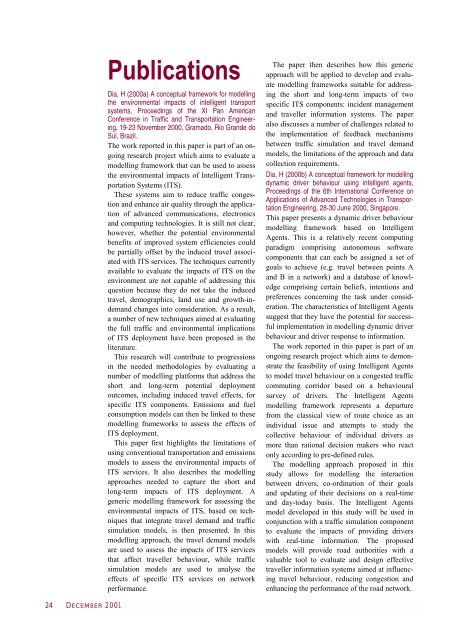
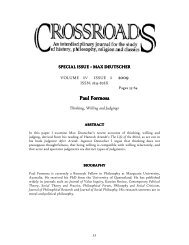
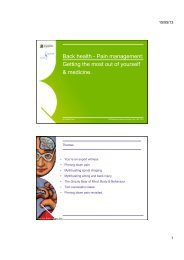
![Recycling [ PDF, 62KB ] - University of Queensland](https://img.yumpu.com/51805185/1/184x260/recycling-pdf-62kb-university-of-queensland.jpg?quality=85)
